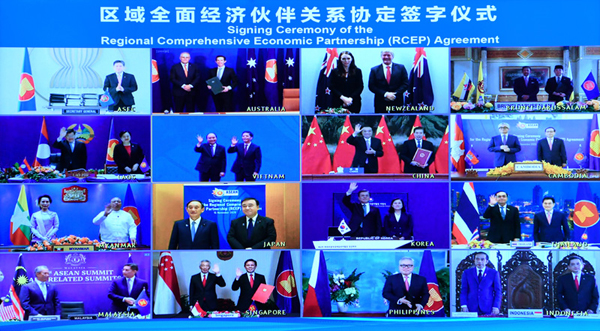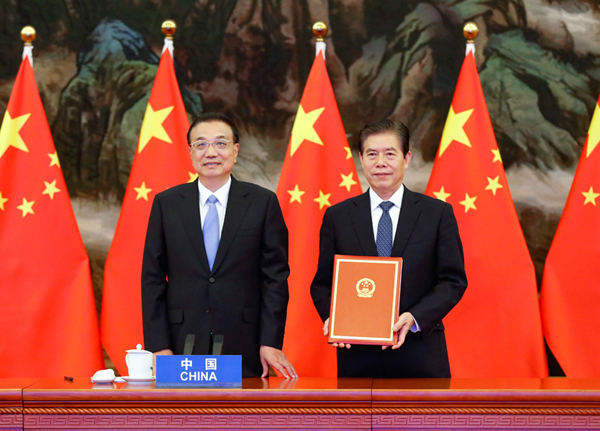The Regional Comprehensive Economic Partnership (RCEP) agreement was officially signed on Nov 15 at the 4th RCEP Summit held via video link.

Premier Li Keqiang attended the meeting with leaders of 10 Association of Southeast Asian Nations (ASEAN) member countries, the Republic of Korea, Japan, Australia and New Zealand.
In his speech, Premier Li called Nov 15 a milestone moment as leaders of all 15 participating countries witnessed the conclusion of the RCEP agreement.
Launching the world’s largest free trade bloc featuring the largest population, most diverse membership and greatest development potential, the RCEP agreement represents not only a landmark achievement of East Asian regional cooperation, but more importantly, it marks a victory of multilateralism and free trade, the Premier said.
The RCEP agreement will lead countries in the region to achieve a high level of opening-up in trade in goods and services, as well as investment within the RCEP framework, the Premier said. It also will help greatly boost liberalization and facilitation for trade and investment across the region, and enhance the region’s appeal and competitiveness.
While giving a strong push to regional economic recovery as a whole and injecting new momentum into its development and prosperity, the RCEP agreement also will emerge as an important engine for global economic development, Premier Li said.
The Premier pointed out that the COVID-19 epidemic is still wreaking havoc globally, while the world economy is suffering a severe recession, global trade and investment are shrinking, and protectionism and unilateralism are escalating.
Against that gloomy backdrop, the signing of the RCEP agreement, which came after eight years of negotiation, offers a ray of light and hope to people, showing that multilateralism and free trade is the right way and remains the correct direction for the world economy and all people, he said.
The RCEP agreement will guide people toward solidarity and collaboration instead of conflicts and confrontations while confronting challenges. Also, the beggar-thy-neighbor approach or wait-and-see attitude will give way to mutual assistance and support, Premier Li said, adding that openness and cooperation is the only path for all countries to achieve win-win results.
Although the road ahead may not always be smooth, joint efforts and firm confidence will absolutely bring a better future for East Asia and even the whole world, he added.
ASEAN countries played a leading role in RCEP negotiations and made crucial contributions, Premier Li emphasized, adding that China will continue to support ASEAN’s centrality and promote the follow-up work of delivering the RCEP agreement.
Countries involved should complete their domestic agreement approval procedures as soon as possible so the agreement will soon take effect to benefit enterprises and people of all countries concerned.

And, specific implementation arrangements for tariff concessions, origin criteria, facilitation measures and related rules should be coordinated promptly to ensure the smooth delivery of the agreement. The RCEP agreement will be jointly built into a major platform for regional economic and trade cooperation featuring openness, inclusiveness, and strengthened mutually beneficial efforts in all fields to seek benefits for all people, the Premier said.
State leaders of RCEP members highly praised the signing of the agreement after eight years of negotiation, believing that it is a historic and significant milestone.
A free trade agreement covering the biggest area in the world, the RCEP agreement will promote the region’s prosperity and stability and bring hopes for post-epidemic economic recovery against the economic backdrop caused by the COVID-19 outbreak, they said, adding that they believe that the RCEP agreement also will be conducive to building an open global economy and facilitate liberalizing investment and trade.
Signing of the RCEP agreement also shows that all parties welcome an open, fair, and win-win global trading system. They prefer multilateralism to protectionism and unilateralism, with a commitment to address challenges together.
All parties said that the RCEP agreement will be open to India, which is welcomed to join early.

After the meeting, Premier Li and other State leaders attended and witnessed the RCEP signing ceremony. Minister of Commerce Zhong Shan signed the agreement on behalf of China.
State Councilor and Foreign Minister Wang Yi, and He Lifeng, head of the National Development and Reform Commission, also attended the event.